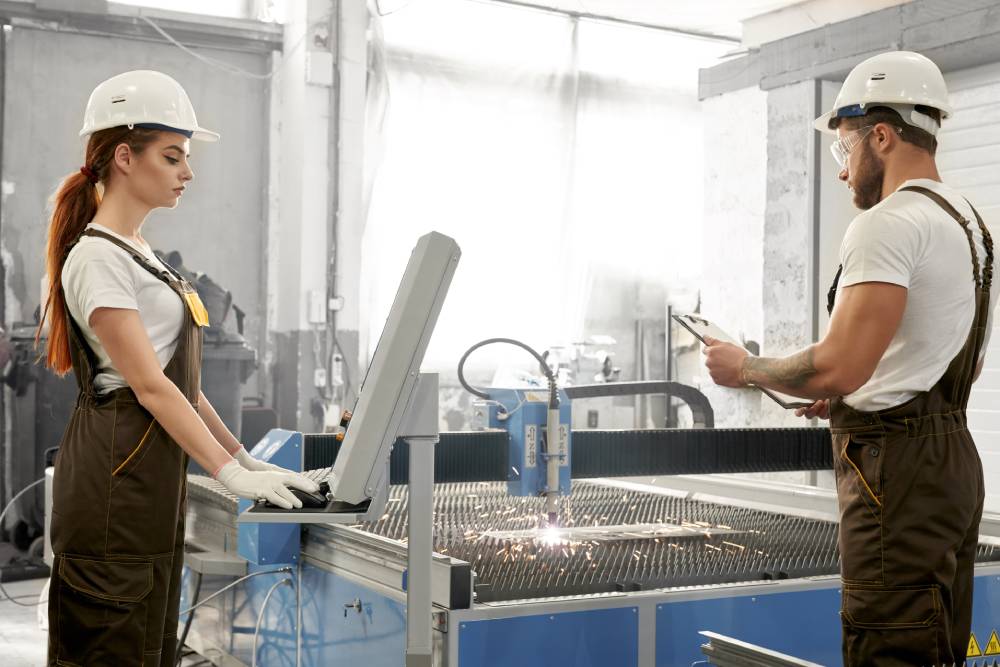CNC Machine
CNC, the commonly used abbreviation of “Computer Numerical Control” machines revolutionize manufacturing processes by automating tasks with precision and efficiency. CNC machines are used in a variety of sectors, including complicated aerospace components and custom carpentry.
CNC machines have variety of types according to the fields that they are used. The various types of this machine allow it to better cater to different needs. CNC Milling machines utilize rotary cutters to remove material from a workpiece, producing complex shapes and designs with high accuracy.
The type that is known as CNC Lathe, rotate workpieces while cutting tools move in various axes, enabling the creation of symmetrical objects like cylinders, cones, and spheres.
CNC Plasma Cutters are specialized equipment used generally in the metal fabrication industry to cut electrically conductive materials such as steel, aluminum, brass, and copper. These devices use a high-temperature, ionized gas called plasma to melt through the material, resulting in accurate cuts with minimal heat-affected zones.
CNC Laser Cutters types are highly versatile machines used across various industries for precise cutting and engraving of a wide range of materials, including metal, wood, plastic, glass, and acrylic. These machines utilize a high-powered laser beam to vaporize or melt material along predefined paths, resulting in intricate cuts with exceptional accuracy. The laser head of the CNC machine directs and concentrates the laser beam on the workpiece. It may use focusing lenses or mirrors to achieve the desired beam diameter and intensity.
Similar to other CNC machines, laser cutters are controlled by a computerized system that interprets design files and generates the toolpaths for the laser head to follow. The workpiece is usually placed on a flat bed or table with a honeycomb or slatted surface to support it and enable for the effective evacuation of dirt and fumes produced while cutting. Laser cutter type of CNC machine are used extensively in metal fabrication for cutting intricate shapes and profiles from sheet metal, tubes, and structural components with high precision and minimal heat-affected zones.
Another type of CNC machines is the CNC Laser router. This type of CNC machine combines the functionality of typical CNC routers with the accuracy and versatility of laser cutting and engraving technology. These machines use a powerful laser beam to cut, engrave, and etch materials like wood, acrylic, plastic, and composites. CNC laser routers provide a hybrid solution for a wide range of applications that need both routing and laser processing capabilities. Laser routers are often used in woodworking industries for cutting, carving, and engraving wood materials to create custom furniture, cabinetry, decorative panels, and architectural elements with intricate designs and details. Combining routing and laser cutting/engraving capabilities of this machine allows for the rapid prototyping of product ideas and architectural models, resulting in detailed prototypes with great accuracy and precision.
Applications of CNC Machines
CNC machines are widely used in a variety of industries due to their adaptability, precision, and efficiency. CNC machines play an important part in a variety of industries, from sophisticated component manufacture to the creation of detailed designs.
The automotive industry is one of the areas where CNC machines are frequently used. They are extensively used for manufacturing precision components such as engine parts, transmission components, chassis, and body panels. The CNC machine enable mass production while ensuring consistent quality and tight tolerances, contributing to the reliability and performance of vehicles.
CNC machines are also critical in the aerospace and defense industries because they produce lightweight, high-strength components for airplanes, spacecraft, missiles, and defensive systems. These machines produce vital parts such as turbine blades, airframe structures, and avionics components while adhering to stringent safety and quality requirements.
Additionally, CNC machines play a pivotal role in the production of medical devices and equipment, including implants, prosthetics, surgical instruments, and diagnostic devices. They enable the production of complicated and patient-specific medicinal components with precise dimensions, hence improving the efficacy and dependability of medical therapies. CNC machining centers and plasma or laser cutters are essential tools in metal fabrication for cutting, milling, turning, and welding processes. They provide a wide range of metal components for a variety of industries, including construction, automotive, and infrastructure.
Advantages of CNC Machines
CNC machine provide numerous benefits that considerably improve production processes and product quality. From enhanced precision to increased efficiency, the benefits of CNC machines are diverse and substantial.
CNC machines excel at continuously producing precise and accurate results. Computerized control of tool movements and cutting settings eliminates human error and ensures tight tolerances, resulting in higher product quality and dimensional precision. This precision is critical in areas like aircraft, medicine, and electronics, where even tiny errors can have serious consequences.
Automation in CNC machines improves manufacturing efficiency and productivity levels. These machines can operate continuously, 24/7, minimizing downtime and maximizing throughput. With rapid tool changes, multi-axis machining capabilities, and high-speed cutting, CNC machines streamline manufacturing processes, leading to shorter lead times and increased output volumes.
It has also benefits in terms of reduced labor costs. By automating repetitive tasks and reducing the reliance on manual labor, CNC machines help lower labor costs for manufacturers. Skilled operators are still required to program and manage CNC processes, although the necessity for heavy manual intervention has significantly decreased. This cost-saving benefit enables businesses to manage resources more efficiently while remaining competitive in the market.
CNC machines include facilities for quality assurance and process monitoring, guaranteeing that each product satisfies high quality standards. These machines allow for proactive maintenance and quality control by monitoring machining parameters, tool wear, and surface finish in real time.
Furthermore, they provide traceability by documenting machining data and process parameters, making it easier to meet regulatory standards and obtain quality certifications.
Consequently, CNC machines are the pinnacle of precise engineering, transforming industrial processes across multiple industries. From automobile parts to elaborate sculptures, CNC machines' versatility and accuracy continue to push the limits of what is possible. As technology advances, CNC machines will continue to drive efficiency, quality, and creativity in manufacturing and design. Embrace the future of precision with CNC machines, which open up unlimited fabrication and manufacturing possibilities.
Product : https://uzma.com.tr/en/category/cnc-syncro-press-brakes


